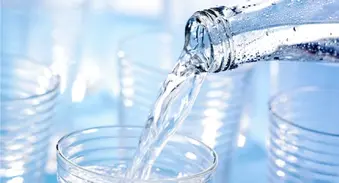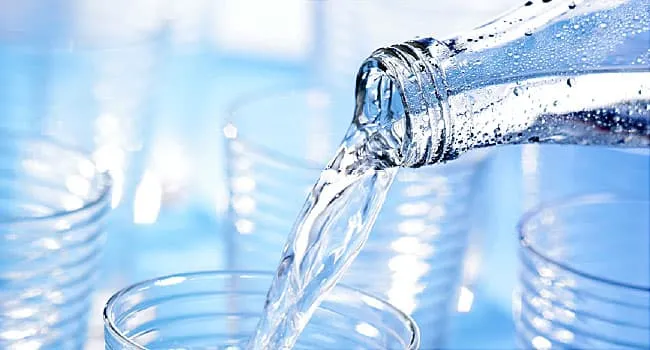Water Quiz: How Much Do You Know About Hydration?

You should drink at least eight glasses of water per day.
- True
- False
There's no evidence to back that up. The Institute of Medicine recommends that men get about 125 ounces of water daily and that women get 91 ounces, but that includes water from all foods and beverages. Most people get enough hydration unless they're exposed to heat stress or they're very active for a long time.
How much of their water do people typically get from food?
- 5%
- 10%
- 20%
- 50%
The average person gets about 20% of their water for the day from food. An apple is 65% water. Bananas are 70% water. Broccoli is about 90% water. Even foods that you might not think of as moist -- a slice of white bread (40% water), ground beef (53%), American cheese (28%) -- help.
Exercise in hot, humid conditions can make you dehydrated in as little as:
- 30 minutes
- 45 minutes
- 1 hour
- 2 hours
It doesn't take long to get dehydrated -- especially in hot, humid weather. So don't exercise hard, outdoors, when it’s too hot and humid. You'll need to take longer breaks, shorten the workout or intensity level, and dress appropriately.
While exercising, most people should break for water every:
- 5 minutes
- 20 minutes
- 40 minutes
- 1 hour
On average, you should take a rehydration break at least every 20 minutes. Most people would stay adequately hydrated by drinking about 7 to 10 ounces of fluid every 10 to 20 minutes during exercise. But your exact need depends on things like how hard you're working, whether you are indoors or outdoors, and your age, gender, and weight.It's also helpful to drink two cups of fluids (about 17 to 20 ounces) about two to three hours before a workout.
Which of the following drinks is the most dehydrating?
- Alcohol
- Coffee
- Sugar-sweetened soda
Alcoholic beverages have the most dehydrating effect. Coffee and other caffeinated drinks do make you urinate more, but overall, they're hydrating because of their water content. Juices, sodas, and other sweet drinks also are hydrating, but contain sugars. Water is usually a better choice for hydration because it doesn’t have extra calories.
The amount of fluid you need to stay properly hydrated depends on:
- Your age
- Your health
- The weather
- All of the above
How much fluid you need depends upon several things, including:
- Age: Kids need plenty of fluids; they can get dehydrated much more easily than adults. Older people may need more fluids because of health conditions or because they tend to lose their sense of thirst.
- Gender: Men need more fluids than women. (And pregnant women need more fluids than other women.)
- Weight: Heavier people need more water.
- Health: Conditions such as diabetes, cystic fibrosis, and kidney disease can boost your need for fluids.
- Environment: You need more fluids in extreme weather conditions (especially hot, humid, or cold) and at high altitudes.
How much water does the average adult lose every day naturally?
- 1 cup
- 2 cups
- 5 cups
- 10 cups
You lose about 10 or more cups of water every day just living: breathing, sweating, urinating, etc. Eating and drinking usually make up for it.
You may be dehydrated if your urine looks like:
- Water
- Lemonade
- Concentrated apple juice
- Grapefruit juice
An easy way to monitor your hydration level is to check the color of your urine. The darker your urine, the less hydrated you are. Drink enough fluids to keep your urine a lighter color. If your urine is clear or pale, chances are you are well hydrated.Other practical ways to monitor your hydration status include keeping an eye on your body weight (you lose weight as you lose water) and perspiration (the more you perspire, the more water you're losing).
Drinking water can help you lose weight.
- True
- False
Water could help with weight loss. Studies show that by drinking water, people tended to eat and drink fewer calories, probably because the water filled them up. As a result, they lost weight.Both studies were short-term, however, and it's unknown if the results would have held up over a longer time.
You should avoid drinks and snacks with sodium when you're trying to rehydrate.
- True
- False
Sodium is something your body needs when you're trying to rehydrate, either during or after exercise. That’s why sports drinks are often rich in sodium -- one of the “electrolytes” your body loses during exercise. Drinks and snacks with sodium also can trigger thirst and help you retain fluids. But too much salt can raise your blood pressure and worsen heart conditions in some people.
You can't drink too much water while exercising.
- True
- False
It is possible to drink too much water. Healthy kidneys in an adult can process anywhere from 20 to 1,000 milliliters of fluid per hour. It's not easy to overload them, but it can happen. Getting too much water, especially in a short time, is dangerous. Symptoms of too much water include weight gain, bloating, nausea, and vomiting. Sudden cases of water intoxication can cause low blood sodium, which can result in headaches, confusion, seizures, and coma.The International Marathon Medical Directors Association recommends that athletes drink no more than 27 ounces of water per hour during extended exercise.
Water helps your body:
- Remove waste
- Move nutrients
- Cushion joints
- All of the above
Your body has water in every cell, tissue, and organ. It helps move nutrients, get rid of waste, keep your temperature at the right level, lubricate and cushion joints, keep your skin moisturized, and lots of other things.
Which of the following is an early warning sign of dehydration?
- Thirst
- Slower breathing
- Slower pulse
- All of the above
Thirst is one of the first warning signals that you may be getting dehydrated. But don't rely on thirst alone. Other early signs are fatigue, flushed skin, faster breathing and pulse rate, and having trouble exercising. Later signs include weakness, dizziness, and labored breathing.If you think you're becoming dehydrated, you should move to a cool place and rehydrate. Drink fluids slowly -- drinking too fast can stimulate urination, resulting in less hydration.
Water is usually as good for rehydration as sports drinks that have electrolytes.
- True
- False
Water is usually enough to rehydrate, unless you're exercising really hard or for a long time. Sports drinks may replace more lost fluids because athletes enjoy the taste. Athletes should drink between 16 and 24 ounces of water or other fluid for every pound they lost during their workout
What percentage of your body weight is water?
- 15% to 35%
- 35% to 55%
- 55% to 75%
- 75% to 95%
The human body is mostly water: up to 60%, on average (and depending on how well hydrated you are). Water makes up about 73% of the brain and heart, 79% of muscles, 64% of the skin and 31% of bones.
